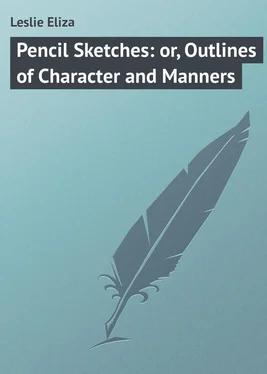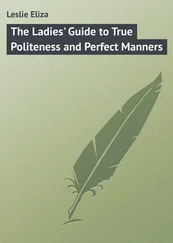Eliza Leslie - Pencil Sketches - or, Outlines of Character and Manners
Здесь есть возможность читать онлайн «Eliza Leslie - Pencil Sketches - or, Outlines of Character and Manners» — ознакомительный отрывок электронной книги совершенно бесплатно, а после прочтения отрывка купить полную версию. В некоторых случаях можно слушать аудио, скачать через торрент в формате fb2 и присутствует краткое содержание. Жанр: foreign_prose, foreign_humor, на английском языке. Описание произведения, (предисловие) а так же отзывы посетителей доступны на портале библиотеки ЛибКат.
- Название:Pencil Sketches: or, Outlines of Character and Manners
- Автор:
- Жанр:
- Год:неизвестен
- ISBN:нет данных
- Рейтинг книги:3 / 5. Голосов: 1
-
Избранное:Добавить в избранное
- Отзывы:
-
Ваша оценка:
- 60
- 1
- 2
- 3
- 4
- 5
Pencil Sketches: or, Outlines of Character and Manners: краткое содержание, описание и аннотация
Предлагаем к чтению аннотацию, описание, краткое содержание или предисловие (зависит от того, что написал сам автор книги «Pencil Sketches: or, Outlines of Character and Manners»). Если вы не нашли необходимую информацию о книге — напишите в комментариях, мы постараемся отыскать её.
Pencil Sketches: or, Outlines of Character and Manners — читать онлайн ознакомительный отрывок
Ниже представлен текст книги, разбитый по страницам. Система сохранения места последней прочитанной страницы, позволяет с удобством читать онлайн бесплатно книгу «Pencil Sketches: or, Outlines of Character and Manners», без необходимости каждый раз заново искать на чём Вы остановились. Поставьте закладку, и сможете в любой момент перейти на страницу, на которой закончили чтение.
Интервал:
Закладка:
"I look forward to his being in the India trade," said Uncle Philip, proudly.
"But suppose, uncle," said Fanny, "he should happen to have French sailors on board his ship?"
"French sailors! French!" exclaimed Uncle Philip; "for what purpose should he ship a Frenchman as a sailor? Why, I was once all over a French frigate that came into New York, and she was a pretty thing enough to look at outside. But when you got on board and went between decks, I never saw so dirty a ship. However, I won't go too far – I won't say that all French frigates are like this one, or all French sailors like those. Besides, this was many years ago, and, perhaps, they've improved since."
"No doubt of it," said Mrs. Clavering.
"Well," pursued Uncle Philip, "I only tell you what I saw."
"But, not knowing their language, you must have misunderstood a great deal that you saw," observed Mrs. Clavering.
"The first-lieutenant spoke English," said Uncle Philip, "and he showed me the ship; and, to do him justice, he was a very clever fellow, for all he was a Frenchman. There must certainly be some good ones among them. Yes, yes – I have not a word to say against that first-lieutenant. But I wish you had seen the men that we found between decks. Some were tinkling on a sort of guitars, and some were tooting on a kind of flutes, and some were scraping on wretched fiddles. Some had little paint-boxes, and were drawing watch-papers, with loves and doves on them; some were sipping lemonade, and some were eating sugar-candy; and one (whom I suspected to have been originally a barber), was combing and curling a lapdog. It was really sickening to see sailors making such fools of themselves. By the bye, I did not see a tolerable dog about the ship. There was no fine Newfoundlander like my gallant Neptune (come here, old fellow), but there were half a dozen short-legged, long-bodied, red-eyed, tangle-haired wretches, meant for poodles, but not even half so good. And some of the men were petting huge cats, and some were feeding little birds in cages."
"Well," said Mrs. Clavering, "I see no harm in all this – only an evidence that the general refinement of the French nation pervades all ranks of society. Is it not better to eat sugar-candy than to chew tobacco, and to sip lemonade than to drink grog?"
"And then," continued Uncle Philip, "to hear the names by which the fellows were calling each other, for their tongues were all going the whole time as fast as they could chatter. There were Lindor and Isidore, and Adolphe and Emile. I don't believe there was a Jack or a Tom in the whole ship. I was so diverted with their names, that I made the first-lieutenant repeat them to me, and I wrote them down in my pocket-book. A very gentlemanly man was that first-lieutenant. But as to the sailors – why, there was one fellow sprawling on a gun (I suppose I should say reclining), and talking to himself about his amiable Pauline, which, I suppose, is the French for Poll. When we went into the gun-room, there was the gunner sitting on a chest, and reading some love-verses of his own writing, addressed to his belle Celestine, which, doubtless, is the French for Sall. Think of a sailor pretending to have a belle for his sweetheart! The first-lieutenant told me that the gunner was the best poet in the ship. I must say, I think very well of that first-lieutenant. There were half a dozen boys crowding round the gunner (or forming a group, as, I suppose, you would call it), and looking up to his face with admiration; and one great fool was kneeling behind him, and holding over his head a wreath of some sort of green leaves, waiting to crown him when he had done reading his verses."
"Well," observed Mrs. Clavering, "I have no doubt the whole scene had a very pretty effect."
"Pshaw," said Uncle Philip. "When I came on deck again, there was the boatswain's mate, who was also the ship's dancing-master (for a Frenchman can turn his hand to anything, provided it's foolery), and he was giving a lesson to two dozen dirty fellows with bare feet and red woollen caps, and taking them by their huge tarry hands, and bidding them chassez here, and balancez there, and promenade here, and pirouette there. I was too angry to laugh, when I saw sailors making such baboons of themselves."
"Now," remarked Mrs. Clavering, "it is an established fact, that without some knowledge of dancing, no one can move well, or have a graceful air and carriage. Why, then, should not sailors be allowed an opportunity of cultivating the graces as well as other people? Why should they be debarred from everything that savours of refinement?"
"I am glad," said Uncle Philip, laughing, "that it never fell to my lot to go to sea with a crew of refined sailors. I think, I should have tried hard to whack their refinement out of them. Why the French first-lieutenant (who was certainly a very clever fellow), told me that, during the cruise, five or six seamen had nearly died of their sensibility, as he called it; having jumped overboard, because they could not bear the separation from their sweethearts."
"Poor fellows," said Fanny, "and were they drowned?"
"I asked that," replied Uncle Philip, "hoping that they were; but, unluckily for the service, they were all provided with sworn friends, who jumped heroically into the sea, and fished the lubbers out. And, no doubt, the whole scene had a very pretty effect."
"How can you make a jest of such things?" said Mrs. Clavering, reproachfully.
"Why, I am only repeating your own words," answered the old gentleman. "But, to speak seriously, this shows that French ships ought always to be furnished with Newfoundland dogs to send in after the lovers, and spare their friends the trouble of getting a wet jacket for them: – Come here, old Nep. Up, my fine fellow, up," patting the dog's head, while the enormous animal rested his fore-paws on his master's shoulders.
Mrs. Clavering now reminded the children that it was considerably past their hour for going to school, but with one accord they petitioned for a holiday, as it was the first day of Uncle Philip's and Sam's return.
"You know the penalty," said Mrs. Clavering; "you know that if you stay away from school, you will be put down to the bottom of the class."
The children all declared their willingness to submit to this punishment rather than go to school that day.
"Now, Kitty Clavering," said Uncle Philip, "you see plainly that their hearts are not in the French: and that it is all forced work with them. So I shall be regularly displeased, if you send the children to school to-day. They shall go with me to the cabin, and we will all spend the morning there."
The cabin was a small wooden edifice planned by Uncle Philip, and erected by his own hands with the assistance of Sam and Dick. It stood on the verge of the river, where the bank took the form of a little cape or headland, which Uncle Philip called Point Lookout. On an eminence immediately above, was the house of Mrs. Clavering, from the front garden of which a green slope, planted with fruit-trees, descended gradually to the water's edge.
The building (into which you went down by a flight of wooden steps inserted in the face of the hill), was as much as possible like the cabin of a ship. The ceiling was low, with a skylight near the centre, and the floor was not exactly level, there being a very visible slant to one side. At the back of this cabin was an imitation of transoms, above which was a row of small windows of four panes each, and when these windows were open, they were fastened up by brass hooks to the beams that supported the roof. In the middle of the room was a flag-staff, which went up through the centre of a table, and perforated the ceiling like the mizen-mast of a ship, and rose to a great height above the roof. From the top of this staff an American ensign, on Sundays and holidays, displayed its stars and stripes to the breeze. There was a range of lockers all round the room, containing in their recesses an infinite variety of marine curiosities that Uncle Philip had collected during his voyages, and also some very amusing specimens of Chinese patience and ingenuity. The walls were hung with charts, and ornamented with four coloured drawings that Captain Kentledge showed as the likenesses of four favourite ships, all of which he, had at different times commanded. These drawings were made by a young man that had sailed with him as mate; and to unpractised eyes all the four ships looked exactly alike; but Uncle Philip always took care to explain that the Columbia was sharpest at the bows, and the American roundest at the stern; that the United States had the tallest masts, and the Union the longest yards.
Читать дальшеИнтервал:
Закладка:
Похожие книги на «Pencil Sketches: or, Outlines of Character and Manners»
Представляем Вашему вниманию похожие книги на «Pencil Sketches: or, Outlines of Character and Manners» списком для выбора. Мы отобрали схожую по названию и смыслу литературу в надежде предоставить читателям больше вариантов отыскать новые, интересные, ещё непрочитанные произведения.
Обсуждение, отзывы о книге «Pencil Sketches: or, Outlines of Character and Manners» и просто собственные мнения читателей. Оставьте ваши комментарии, напишите, что Вы думаете о произведении, его смысле или главных героях. Укажите что конкретно понравилось, а что нет, и почему Вы так считаете.












